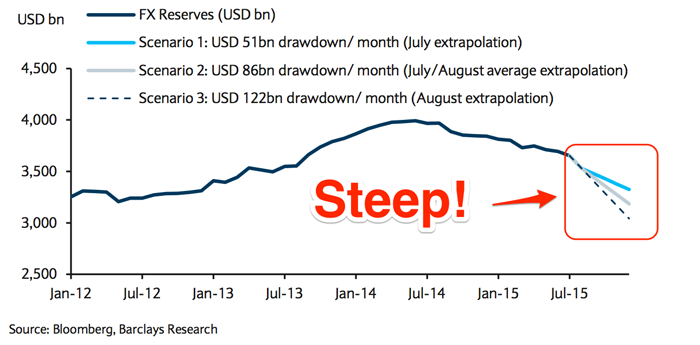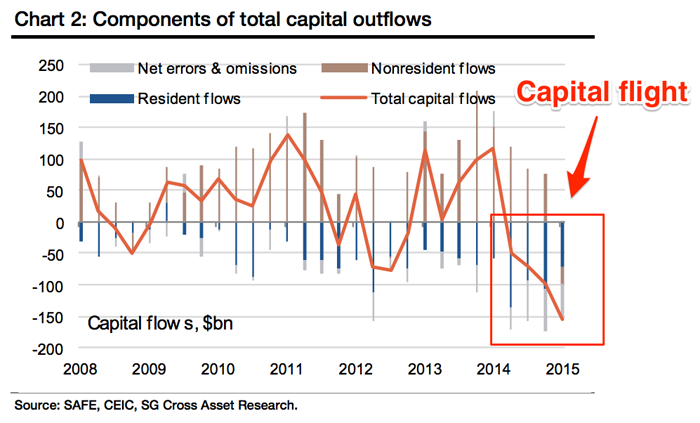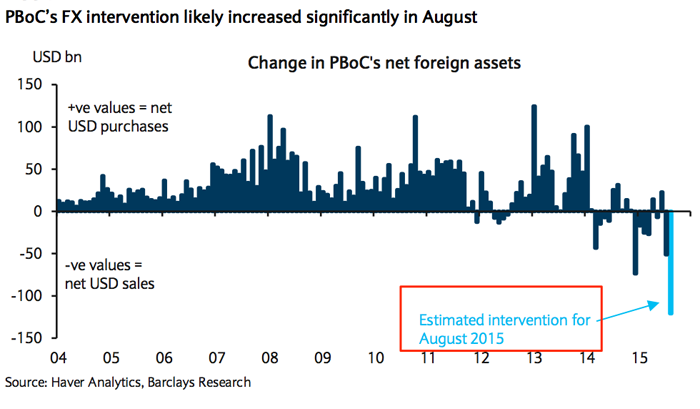The People`s Bank of China is spending all this cash on propping up its currency, the yuan, which has been suffering since China devalued it against the dollar.
China`s central bank is selling the dollars it holds and buying yuan in a bid to boost the price by juicing the supply and demand ratios.
But the problem for China is that as it burns through its reserves at a faster pace, it signals to the market that the currency has further to fall — the currency needs propping up, meaning the demand is artificial.
That`s speeding up a capital flight from the country. A falling currency makes it more expensive for people to shift their assets overseas and if it looks like the yuan is going to keep falling, people make a run for the exits.
And as money flees the country, China is forced to spend more to prop up the currency, which causes more angst for investors — it`s a vicious circle.
Tom Orlick, Bloomberg`s chief Asia economist, said in an email this morning (emphasis ours):
The hope for the PBOC [People`s Bank of China], we believe, is that extreme selling pressure on the yuan subsides and they can allow a moderate depreciation to restore export competitiveness. The fear is that today’s data will reinforce the market view that the only way for the yuan to go is down, and further accelerate capital outflows.
The chart below from Societe Generale shows just how much money has leaked out of China in the last year — around $150 billion:

All of this has a big effect on the US economy too, because of how much American debt China holds. To buy yuan and sell dollar it looks like China is selling some of its US Treasury holdings.
This could push up the yield on US debt and make it more expensive for the US, the world`s largest economy, to borrow.
Here`s Orlick again:
There are also global implications, as news reports and the U.S. Treasury data suggest China is selling down its Treasury holdings. There’s no sign that’s the doomsday scenario of a fire sale. But clearly a sustained shift from buying to selling from China would add pressure for Treasury yields to rise.
US bonds are major benchmark for debt worldwide because they`re considered the safest assets in the world. If interest rates go up in US debt, they`re likely to go up everywhere. Low US interest rates have been calming the markets since the last crisis in 2008.
China gave the markets a shock in August by devaluing its currency, but the amount China is spending to prop up the yuan shows it might`ve fallen more than the policymakers thought.
Barclays had a good note on this last week, saying:
In the first couple of days after the adjustment to the fixing mechanism was announced the CNY weakened sharply, which created significant pressure in global markets. It is unlikely that this was the expected reaction in China, as since then the authorities have intervened to prevent any repeat.
Here`s what that looks like in context of previous changes:

There are lots of different ways this could go, but they all point to China`s reserves getting a hammering. It just depends how quickly.
Given today`s figures we`re currently somewhere between Barclays` "Scenario 2" and "Scenario 3". In other words, it`s not quite as bad as the worst case scenario from Barclays, but not far off:

















































